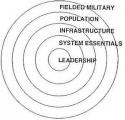analysis despite the overblown opening statement. The key question is what more US/NATO troops are expected to do. More troops may well be a necessary first step to getting where Bacevich desires. I certainly hope that GEN Petraeus' JSAT takes Bacevich's argument into account but there is more to the situation than can be stated in a brief article in Newsweek.
Cheers
JohnT











 . Think of it as "Open Planning" no need to be right, just brain storm.
. Think of it as "Open Planning" no need to be right, just brain storm.


 , I'm not sure that the Party's patented version of Nirvana is what they are implementing. More likely it is the Nirvana aspired to by the finanacial backers who fund (and script the rhetoric of) the Party's mouthpieces and affiliated lobbyists/think tanks. But this is not a political board . . .
, I'm not sure that the Party's patented version of Nirvana is what they are implementing. More likely it is the Nirvana aspired to by the finanacial backers who fund (and script the rhetoric of) the Party's mouthpieces and affiliated lobbyists/think tanks. But this is not a political board . . . 
Bookmarks